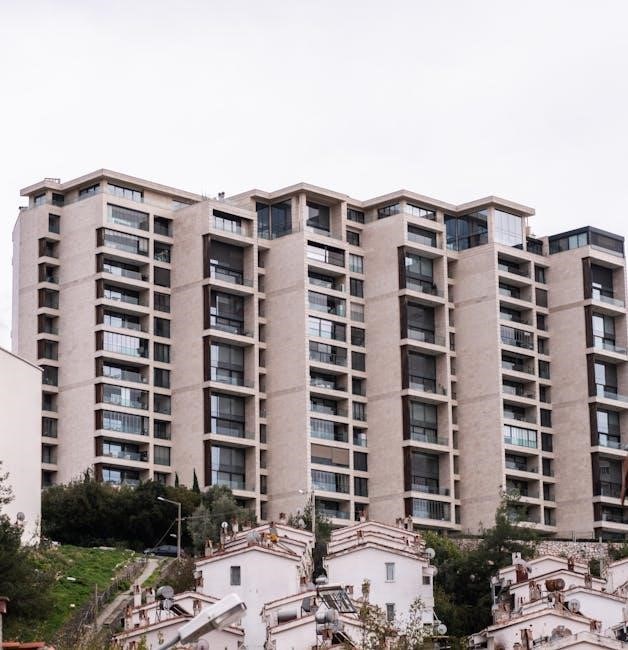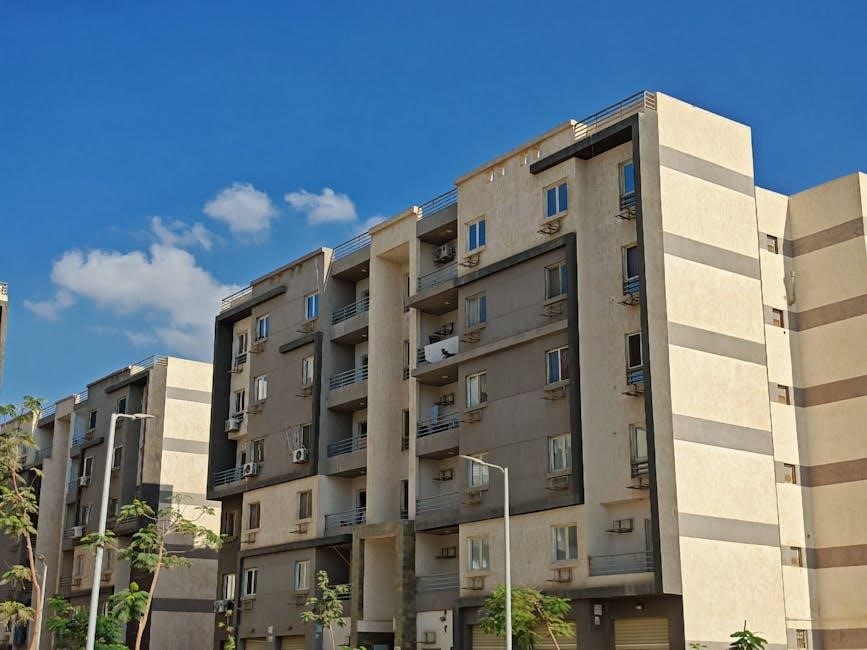Hawaii Condominium Guide: An Overview
Navigating Hawaii’s condo market requires understanding CPRs, HRS Chapter 514B, and HOA regulations—essential for prospective buyers seeking a slice of paradise.
Understanding Condominium Property Regimes (CPR)
Condominium Property Regimes (CPRs) are fundamental to Hawaii’s condo ownership structure, enabling individual ownership within a multi-unit property. Developers must file a public report – a disclosure statement – with the Hawaii Real Estate Commission (HIREC) before selling units. This report details crucial information for potential buyers.
The HIREC review and issuance of an effective date for the public report is a critical step, typically taking six to eight weeks, potentially longer for complex projects. This date signifies units can legally be sold. Understanding the CPR process, including the developer’s public report, is vital. Resources, including registration packets and forms, are available on the HIREC website (www.hawaii.gov/hirec) or by calling (808) 586-2644.
The Legal Framework for Hawaii Condos
Hawaii’s condominium laws are primarily governed by Hawaii Revised Statutes (HRS) Chapter 514B, establishing rules for formation and management.
Hawaii Revised Statutes Chapter 514B
Hawaii Revised Statutes (HRS) Chapter 514B is the cornerstone of condominium law in the state, providing a comprehensive legal framework. This chapter covers a wide range of topics, beginning with general provisions like the short title (514B-1) and applicability (514B-2). Crucially, it includes detailed definitions (514B-3) of key terms used throughout the chapter, ensuring clarity and consistent interpretation.
Further provisions address separate titles and taxation (514B-4), ensuring proper ownership and fiscal responsibility. The statute also emphasizes conformance with county land use laws (514B-5), acknowledging local zoning regulations. Finally, it allows for supplemental county rules governing a condominium property regime (514B-6), providing flexibility for local governance. Understanding this chapter is vital for anyone involved in Hawaii condominium transactions.
Definitions and Key Terms
Within Hawaii Revised Statutes Chapter 514B, precise definitions are crucial for navigating condominium law. Key terms like “condominium property regime” (CPR) establish the legal structure governing shared ownership. Understanding “common elements” – areas used by all owners – versus “unit” – individually owned spaces – is fundamental.
The statute also defines “developer,” “owner,” and “association,” clarifying responsibilities. “Limited common elements” – features used by a specific group of units – require careful consideration. “Assessments” refer to fees paid by owners for common expenses. Familiarity with these terms, as outlined in 514B-3, is essential for interpreting condominium documents and understanding your rights and obligations as a buyer or owner in Hawaii.

The Buying Process: A Step-by-Step Guide
Secure a local agent, review the developer’s public report, and navigate CPR approval—critical steps for a smooth Hawaiian condo purchase experience.
Finding a Local Real Estate Agent
When considering a Hawaii condo purchase, partnering with a knowledgeable local real estate agent is paramount. Life in Hawaii differs significantly from the mainland, and local professionals possess unmatched expertise regarding the unique aspects of the islands’ real estate market.
A skilled agent can expertly navigate property viewings, connect you with reliable property managers, and thoroughly research crucial details like zoning regulations and applicable tax laws. They understand the intricacies of Condominium Property Regimes (CPRs) and the developer’s public report process.
Don’t rely solely on broad online searches; a local agent provides invaluable, on-the-ground insights, ensuring you make a well-informed decision when investing in your Hawaiian vacation home.
Reviewing the Developer’s Public Report
Before purchasing a Hawaii condominium, meticulously reviewing the developer’s public report is a critical step. This disclosure statement, available through the Hawaii Real Estate Commission (HIREC), provides essential information about the project and the developer.
The report details the condominium’s features, financial aspects, and any potential risks. It’s a crucial document for prospective buyers to understand the property fully. Obtaining this report is part of the CPR approval process, which can take six to eight weeks, potentially longer for complex projects.
Once the report is filed and approved, HIREC issues an effective date, signifying units can legally be sold. Access registration packets and the public report form on the HIREC website: www.hawaii.gov/hirec.
CPR Approval Process & Timeline
The Condominium Property Regime (CPR) approval process in Hawaii is essential before units can be legally sold. Developers must first file a public report with the Hawaii Real Estate Commission (HIREC), a comprehensive disclosure statement for potential buyers.
HIREC then reviews the report for completeness and accuracy. This process typically takes between six to eight weeks, though larger or more intricate condominium projects may require a longer review period. Upon approval, HIREC issues an effective date, authorizing the sale of individual units.
For detailed information, visit www.hawaii.gov/hirec or contact the condominium hotline at (808) 586-2644, or email hirecdcca.hawaii.gov.
Financial Considerations When Buying
Budgeting for Hawaii condos involves understanding common expenses, property taxes, and potential assessments—crucial factors impacting long-term ownership costs and investment returns.
Understanding Common Expenses
Common expenses in Hawaii condominiums encompass a variety of costs shared amongst owners, vital for maintaining the property and amenities. These typically include maintenance of common areas like landscaping, elevators, and hallways, as well as building insurance and reserve funds for future repairs.
Homeowners Protection Bureau resources highlight that the Act applies to all condominiums, providing a framework for managing these expenses. Understanding how these funds are allocated is crucial.
Potential buyers should carefully review the condominium’s budget to assess the monthly fees and what they cover. Larger or more complex condominiums often have higher common expenses due to increased maintenance needs and amenities. Proper budgeting ensures financial stability and avoids unexpected costs down the line, contributing to a positive ownership experience.
Property Taxes and Assessments

Hawaii property taxes on condominiums are calculated based on the assessed value of the unit and the land it occupies, subject to county-specific rates. These taxes are a recurring expense for condo owners, alongside potential special assessments.
Special assessments are one-time fees levied for major repairs or improvements, like roof replacements or significant renovations. Prospective buyers should inquire about any planned or potential assessments, as these can substantially impact ownership costs.
Local real estate professionals possess unmatched knowledge of area tax laws and can provide valuable guidance. Understanding both property taxes and potential assessments is crucial for accurate budgeting and financial planning when investing in a Hawaii condominium, ensuring a transparent and informed purchase.

Condominium Management and Governance
Effective HOA management ensures property upkeep, enforces rules, and manages common expenses—vital for maintaining Hawaii condo values and a harmonious living environment.
Homeowners Association (HOA) Responsibilities
The Homeowners Association (HOA) in Hawaii condominiums carries significant responsibilities, outlined by state laws and governing documents. These duties encompass maintaining common areas – landscaping, pools, elevators, and building exteriors – ensuring they remain safe and aesthetically pleasing. HOAs are also tasked with collecting assessments from owners to fund these maintenance efforts and operational costs.
Furthermore, HOAs enforce the condominium’s rules and regulations, promoting a consistent living experience for all residents. This includes addressing violations and mediating disputes. They manage the condominium’s finances, preparing budgets, and maintaining accurate records. Crucially, HOAs must adhere to Hawaii Revised Statutes, ensuring transparency and accountability in their operations, and providing a framework for condominium formation and management.
Voting Rights and Procedures
In Hawaii condominiums, voting rights are typically allocated based on ownership interest, often proportional to the size or value of each unit. However, governing documents may establish different allocation methods. Understanding these procedures is crucial for participation in HOA decisions.
HOA meetings require proper notice to all owners, outlining the agenda and providing opportunities for input. Voting can occur in person, by proxy (allowing another owner to vote on your behalf), or potentially electronically, depending on the condominium’s bylaws. Quorum requirements – the minimum number of owners needed to be present for valid votes – must be met. The Act applies to all condominiums, providing a framework for operation and voting rights.

Hawaii HOA Laws and Regulations

Hawaii’s condominium laws, including the Act, govern HOA operations, ensuring fair management, common expense handling, and protecting homeowner voting rights statewide.
Homeowners Protection Bureau Resources
The Homeowners Protection Bureau (HPB) serves as a vital resource for Hawaii condominium owners and prospective buyers. HPB provides information and assistance regarding condominium governance, dispute resolution, and compliance with Hawaii Revised Statutes. They offer guidance on understanding HOA responsibilities, interpreting condominium documents, and navigating potential conflicts within a condominium community.
HPB’s resources are particularly helpful for understanding the legal framework surrounding condominium formation, management, and operation. They address common concerns related to common expenses, voting rights, and the overall operation of a condominium property regime. For direct assistance, you can find valuable information on their website or contact them for specific inquiries related to Hawaii’s condominium laws and regulations. Their expertise ensures a smoother experience for all involved.

Due Diligence: What to Investigate Before You Buy
Thoroughly review zoning laws, land use regulations, and all condominium documents—including the developer’s public report—to ensure a sound investment.
Zoning and Land Use Laws
Understanding Hawaii’s zoning and land use laws is crucial before purchasing a condominium. These regulations, set by each county, dictate how properties can be used – impacting potential rental income and future development. A local real estate agent can assist in researching these specifics for your desired property.
It’s vital to confirm if short-term rentals are permitted, as restrictions vary significantly across the islands. Investigating potential changes to zoning laws is also prudent, as these could affect property value. County planning departments offer detailed information, and a review of the developer’s public report will often address zoning compliance. Ignoring these aspects could lead to unexpected limitations on your property’s use and profitability.

Reviewing Condominium Documents
Thoroughly reviewing condominium documents is paramount before finalizing any purchase in Hawaii. This includes the Declaration of Condominium Property Regime (CPR), bylaws, house rules, and financial statements. Scrutinize the developer’s public report for disclosures regarding the property’s history and potential issues.
Pay close attention to restrictions on rentals, pet policies, and any planned assessments. Understanding common expense allocations is vital for budgeting. Legal counsel specializing in Hawaii condominium law can provide invaluable assistance in interpreting these complex documents. Don’t hesitate to ask questions and seek clarification on anything unclear – a well-informed decision protects your investment.

Rental Potential and Restrictions
Hawaii’s short-term rental landscape is evolving; investigate county regulations and HOA rules impacting rental income, alongside property management service options.
Short-Term Rental Regulations
Hawaii’s counties are actively regulating short-term rentals (STRs), impacting condominium owners considering this income stream. Each island (and even specific districts within islands) may have distinct rules regarding permits, zoning, and operational requirements. Prospective buyers must thoroughly research the specific regulations applicable to the condominium’s location.
Restrictions can range from outright bans on STRs in certain areas to limitations on the number of rental days per year or requirements for on-site management. Violations can result in substantial fines. Before purchasing, confirm the condominium’s compliance with all applicable STR laws and the HOA’s stance on short-term rentals, as some associations prohibit them entirely. Due diligence is crucial to avoid legal issues and ensure a viable rental investment.
Property Management Options
For mainland or busy owners, Hawaii offers diverse property management solutions for condominiums. Full-service companies handle everything from tenant screening and rent collection to maintenance and legal compliance, typically charging a percentage of the monthly rental income. Alternatively, owners can opt for limited-service options focusing on specific tasks like marketing or maintenance.
Selecting a local company with proven experience in Hawaii’s unique rental market is vital. A trustworthy agent can navigate complex regulations, maximize rental income, and ensure tenant satisfaction. Consider factors like communication responsiveness, maintenance capabilities, and familiarity with local vendors. Researching online reviews and obtaining referrals from other condo owners is highly recommended before entrusting your investment to a property manager.

Resources for Prospective Buyers
The Hawaii Real Estate Commission (HIREC) and its hotline offer vital assistance, alongside online resources, for navigating Hawaii’s condominium purchasing process effectively.
Hawaii Real Estate Commission (HIREC)
HIREC plays a crucial role in regulating Hawaii’s real estate industry, including condominiums. Prospective buyers can access condominium registration packets and the developer’s public report form directly on the Commission’s website – www.hawaii.gov/hirec. This public report is a vital disclosure statement, providing essential information before purchase.
The Commission issues an effective date for sales once the developer’s public report is filed, a process typically taking six to eight weeks, potentially longer for complex projects. For direct assistance, utilize the condominium hotline at (808) 586-2644 or email hirecdcca.hawaii.gov. HIREC ensures transparency and compliance within the condominium market, protecting potential buyers and fostering a fair environment.
Contacting HIREC for Assistance
When navigating the complexities of a Hawaii condominium purchase, the Hawaii Real Estate Commission (HIREC) stands as a valuable resource. Direct communication with HIREC can clarify uncertainties regarding the developer’s public report, CPR approval processes, and general condominium regulations.
Reach out to HIREC via their dedicated condominium hotline at (808) 586-2644 for immediate assistance. Alternatively, email inquiries can be sent to hirecdcca.hawaii.gov. Their official website, www.hawaii.gov/hirec, provides a wealth of information, downloadable forms, and updates on relevant legislation. Don’t hesitate to leverage HIREC’s expertise to ensure a smooth and informed buying experience.
